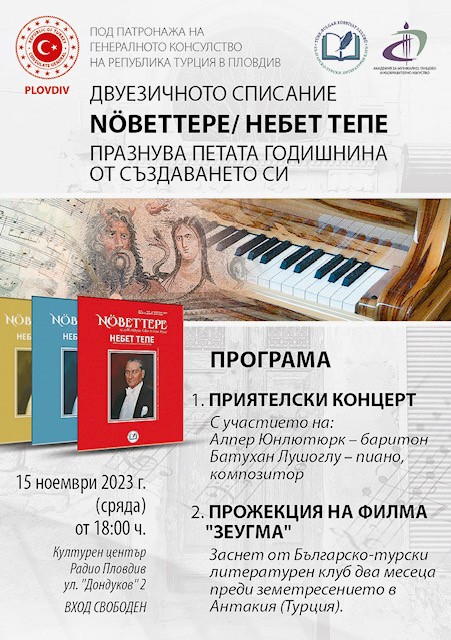Българско-турският литературен* клуб кани пловдивчани да отпразнуват петата годишнина на двуезичното списание на Пловдив Nöbettepe/ Небет тепе в Културен център на Радио Пловдив на 15 ноември 2023 г. (сряда) от 18:00 часа. На събитието ще бъде представен и специалния 21 брой.

Ново двуезично списание за култура тръгва от Пловдив
Мотото на годишнината е "Постоянство в името на двуезичната литература и красотата!", а празникът обещава да докосне публиката до магия на словото. В програмата са включени и приятелски концерт с участието на: Алпер Юнлютюрк – баритон и Батухан Лушоглу – пиано.
Гостите на събитието ще имат възможността да видят документалния филм „Зеугма“, заснет от Българско-турски литературен клуб два месеца преди земетресението в Антакия (Турция).

Антакия, също като Пловдив е древен римски град, с антични мозайки, разкрити и експонирани като тези в Епископската базилика на Филипопол; град в който от векове съжителстват в хармония различни етноси и религии. През този регион минава и Пътя на коприната, който пресича и Пловдив. Както в Пловдив, така и в Антакия съществуват реално действащи храмове на различни религии.
**
Българско-турският литературен клуб е създаден преди десет години. В него членуват преподаватели от Пловдивския, Шуменския, Софийския и Анкарския университет, БАН, студенти, турски и български поети и писатели, издатели и представители на медиите.
Клубът инициира срещи с творци на словото от двете държави, организира представяния на книги, участва активно във фестивала „Пловдив чете”, организира литературни конкурси, детски празници насърчаващи четенето, издава двуезичното списание „Небет тепе“, участва активно в културния и социалния живот на града и областа и в благотворителни събития.
Българско-турски литературен клуб подготвя и издава списание „Небет тепе” – двуезично издание, в което студенти и утвърдени турски и български поети и писатели публикуват своите творби. Списанието се издава четири пъти годишно, в момента се разпространява 21-ви брой. Селекцията се извършва от редакционна колегия – проф. Евдокия Борисова, проф. Хюсеин Мевсим, доц. Елена Гетова, проф. Йорданка Бибина, д-р Харун Бекир, д-р Азис Шакир, проф. Хасине Шен, д-р Антон Баев и др. Главен редактор на списание




